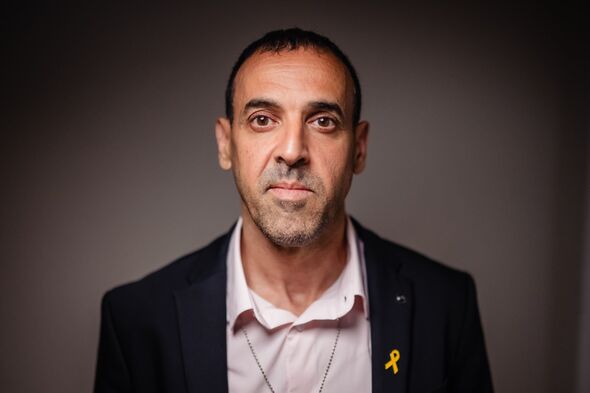Survivor of Hamas Kidnapping Shares Painful Journey in New Book

The harrowing experiences of Eli Sharabi during his 491 days in captivity have been detailed in his new book, *Hostage*, released on the second anniversary of the October 7 attacks. On that fateful day in 2023, masked Hamas terrorists stormed his home in Kibbutz Be’eri, near Israel’s southern border, leading to the abduction of Sharabi and the tragic murder of his family.
Sharabi vividly recalls the terror in the eyes of his British wife, Lianne Brisley, and their daughters, Noiya (16) and Yahel (13), as they were confronted by the armed assailants. “I will never forget the look of terror in their eyes,” he reflects during an exclusive interview via Zoom. Tragically, Sharabi never saw his family alive again. Shortly after his abduction, all three were killed in their home.
In his narrative, Sharabi recounts the moment he was forced into a stolen vehicle, praying fervently, “Just not a tunnel, please, God, not a tunnel.” This plea stemmed from a deep fear of being buried alive in darkness, which he ultimately experienced. On October 7, approximately 250 Israelis were taken across the border into Gaza, while at least 1,195 others, including Sharabi’s family, were murdered.
Sharabi’s ordeal did not end with his initial abduction. He learned of his family’s fate only after being reunited with surviving relatives upon his release on February 8, 2024, in a deal between Hamas and the Israeli government. By this time, he weighed less than 45 kilograms due to starvation, beatings, and extended periods of confinement in darkness.
Despite the physical and emotional toll, writing *Hostage* has provided a therapeutic outlet for Sharabi. “It represents an important part of my country’s history,” he states. He acknowledges the difficulty of revisiting these traumatic memories but recognizes their significance in understanding the broader context of the conflict.
Returning to the Scene of Trauma
Recently, Sharabi made a poignant return to his former home, the site of his family’s murder. Although he felt a strong desire to enter the house, he ultimately chose to wait, guided by his therapist’s advice that healing takes time. “Not just yet,” he said, emphasizing the ongoing struggle to navigate his grief.
As he adjusts to life post-captivity, Sharabi is also advocating for the release of the remaining hostages. He remains surrounded by family and friends, drawing strength from their support. He plans to move into his own apartment soon, viewing it as a crucial step toward reclaiming his life. “I have to start my life again,” he asserts. “I am so lucky to be alive and to be a free man. Freedom is priceless.”
During his captivity, Sharabi was held with various hostages, some of whom, such as Alon Ohel, have not yet been released. He recalls the camaraderie formed among the captives, often participating in prayers and Jewish rituals to maintain hope. “I never once thought I wouldn’t survive,” he reflects, emphasizing his resilience even in dire conditions.
The harsh reality of starvation was a constant presence throughout his imprisonment. In the final months, Sharabi subsisted on minimal portions, often just half a pita or a small bowl of pasta daily. He describes how hunger transformed the dynamics among hostages, stating, “The hunger turns each man inward. Empathy dries up.”
The living conditions deteriorated further when sanitation issues arose, leading to the accumulation of sewage in their confinement area. Sharabi recalls the humiliation of sharing a toilet with fellow captives, a frequent source of degradation during their ordeal.
Looking Ahead
Born in Tel Aviv-Yafo, Sharabi moved to Kibbutz Be’eri at age 14. He met Lianne, then a volunteer from the UK, in 1995, and they later married. Following his release, his first call was to Lianne’s parents, with whom he had shared many cherished Christmases before the attacks.
Despite the overwhelming grief, Sharabi remains focused on advocating for the remaining hostages and is committed to raising awareness about their plight. “Most Israelis I speak to have had enough,” he says, highlighting the exhaustion felt by many amid ongoing conflict.
Looking to the future, Sharabi aspires to work as a private maths tutor for young people. “I will not let the grief and sadness bury me,” he emphasizes. “I choose to move on and be positive, I choose light.”
*Hostage* by Eli Sharabi is now available for purchase at £18.99. Through his story, Sharabi not only confronts his past but also contributes to a collective memory of resilience in the face of unimaginable loss.






